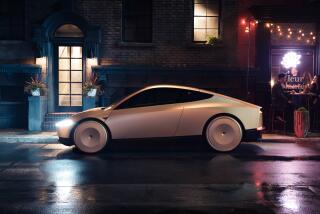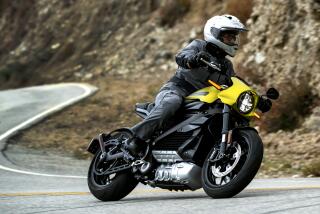Tesla to supply batteries for electric cars
- Share via
In a move that could help promote development of batteries for electric and plug-in hybrid cars in the U.S., California’s Tesla Motors Inc. plans to announce a $43-million, two-year deal this morning to supply electric-car batteries to Think, a Norwegian manufacturer of low-speed, electric “city” cars.
The deal is expected to bring San Carlos, Calif.-based electric car maker Tesla’s new battery development unit closer to the production volume needed to foster investment in additional automation equipment for its labor-intensive battery facility in Thailand.
“The more we can produce and sell, the more money we can generate to invest in more robotics” to help lower the cost of the batteries, said Darryl Siry, Tesla’s marketing director.
He said Tesla would be making a profit from the sales of its advanced lithium-ion batteries to Think. The Norwegian company apparently will use a national tax-subsidy program to make its cars affordable to consumers there.
Lithium-ion batteries store more energy in less space than the nickel-metal hydride batteries now used in most gas-electric hybrid cars. Perfecting them for automotive use is the focus of an industry-wide effort to bring electric cars and more powerful hybrids with extended all-electric range into the market.
But they’re expensive. The 6,831-cell battery packs Tesla makes for the $98,000 limited-production electric roadster it recently began selling cost the company about $25,000 per vehicle, according to industry sources. Siry would only say that the cost of the roadster batteries is “north of $20,000.”
The battery packs to be assembled for Think are much smaller because the company’s two-seat city car is a short-range, lightweight vehicle with a top speed of about 50 mph.
The Tesla roadster is a full-sized two-seat sports car capable of speeds of 130 mph and is expected to achieve a range rating of 200 miles-plus on a single charge.
The deal with Think doesn’t represent the breakthrough in battery technology that automakers such as General Motors Corp. say is needed to make mass-production electric cars feasible.
For that to happen, the cost and energy efficiency of lithium-ion or other types of batteries must be improved beyond what today’s technologies allow, said Ron Cogan, publisher of the San Luis Obispo-based Green Car Journal and a longtime observer of the electric-car movement.
“But any movement is good for the industry,” Cogan said. “You have to start somewhere.”
Cogan questioned the affordability of Think vehicles equipped with Tesla batteries.
But Siry said that electric vehicles in Norway are exempted from a 100% tax on motor vehicles that doubles the price of other cars. The tax break could amount to a subsidy of $20,000 or more per car, depending on Think’s retail pricing.
The cars will be sold in Europe, but not in the U.S.
Ford Motor Co., which owned Think from 1999 to 2002, had experimented with a few hundred of the plastic-bodied cars here, but shipped them back to Norway and unloaded Think to a European investment group after declaring it was unable to make a case for U.S. sales of a 50 mph car with just 50 miles of range on each battery charge.






